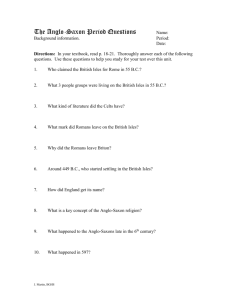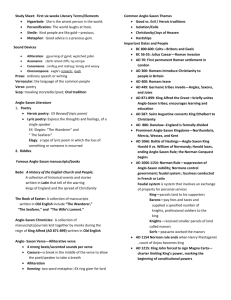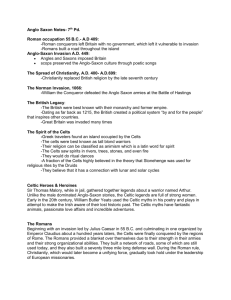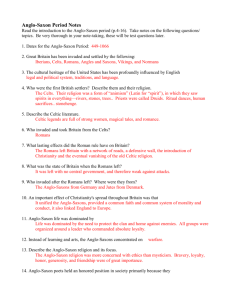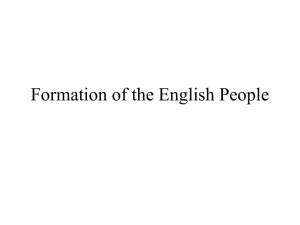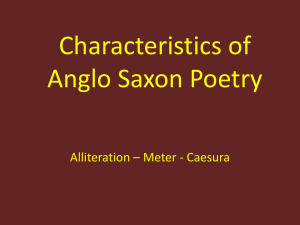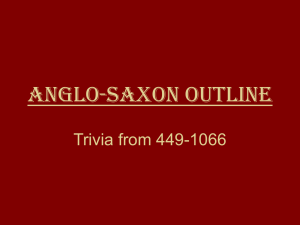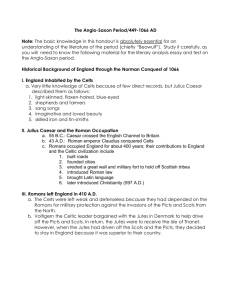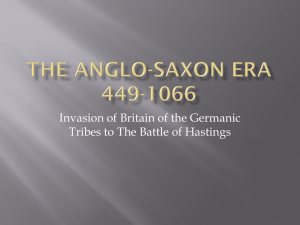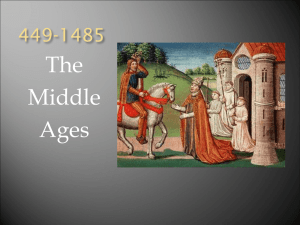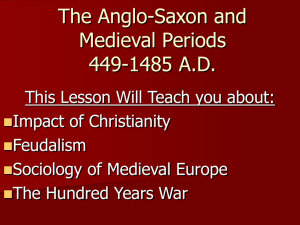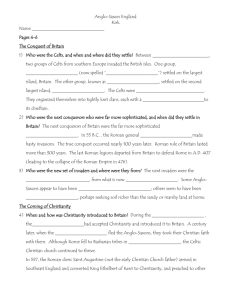Anglo-Saxons: History, Culture, and Religion (450-1066)
advertisement
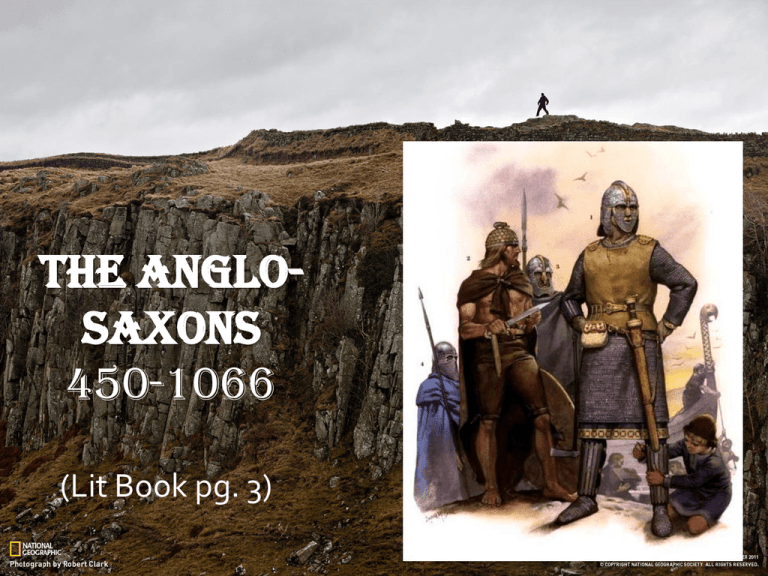
The AngloSaxons 450-1066 (Lit Book pg. 3) Why Study England and its history? America and other world democracies would not be what they are today without legacy of England: • Law/parliamentary government • Literature • Language Before the Celts and Romans, England was a dark, green, isolated island. Then the “rise of the West” happened, as Rome and Europe expanded. The Celts (300s BC) • The Celts practiced Animism (spirits in all aspects of nature, controlled daily life, priests called Druids acting as intermediaries) • Unlike the Anglo-Saxon tales, Celtic mythology had more powerful female figures, more “sunlight” and magic, fantastic animals, love affairs, and adventures The Romans: The Great Administrators • Julius Caesar conquered the Britons in 55 B.C. • Romans brought Christianity (missionaries), armies, organization, roads • Rome vacated Britain and left infrastructure, but no government. British inhabitants were in separate clans, a weak island ripe for conquering The Anglo-Saxon Invasions (400s AD) • After Rome left, Britain was invaded by as many as 200,000 Angles and Saxons from Denmark and Germany, who brought new language to “Engla-land” (land of the Angles) • In the late 800s, Anglo-Saxon King Alfred of Wessex united England against Viking invaders • Christianity was spread by Irish and European missionaries (convert the AS kings = convert their subjects), provided a common faith, morality, and link to Europe • The AS period ended in 1066, with the arrival of the Norman duke (and later king) William the Conqueror Anglo-Saxon Life • Anglo-Saxon life was centered on warfare, but they were not barbarians: they had a system of law and order that involved responsibility of leaders, loyalty, and gift-giving to leaders • AS society was communal, centered around the hall of their leader/king. • Loyalty and closeness meant survival and safety in times of warfare. • Christianity also eventually became a key center of their lives. King/Leader’s Hall Everyone else lived closely centered around it The Anglo-Saxon Religion: Gods for Warriors • A key belief was that fame in life (through heroic deeds) meant one would live on after death. • The old AS religion came from the Scandinavian mythology of “warrior gods”: – Odin – god of death, poetry, and magic; associated with burial rites – Thunor/Thor – god of thunder and lightening; his sign was the hammer – The dragon: protector of treasure, guardian of the grave mound– seen as personification of “death the devourer” and guardian of grave mound • The three key ethics of AS society: – Loyalty – Bravery – Generosity A Light from Ireland • Ireland was different from surrounding countries in the 5th century because they continued to be Celts with Roman influence (no invaders) • Patrick, a Romanized Briton (an escaped/converted slave), converted Celtic Ireland to Christianity. • Ireland was able to experienced a golden age of peace and learning while much of Europe was at war The Christian Monasteries • Monasteries: places if learning and preserving great works and stories of the period, regardless of if they were Christian • Scriptorium: Where monks copied manuscripts by hand • Latin: the serious language of study… until King Alfred wrote “The Anglo-Saxon Chronicle” in (Old) English, which began to slowly take hold in England Bards and the Oral Tradition • Bards (also called “scops”): skilled storytellers who sang poems of gods and heroes, stories passed along orally • Bards worked with a rich supply of heroic tales, reflecting concerns of AS life • Much AS poetry stresses fame in the afterlife through brave and good works in life (heroes) • Bards’ songs also dealt with ideas of fate and religion • Bards were honored in society for entertainment and for keeping the culture and its stories alive Beowulf in Old English (Anglo-Saxon) HWÆT, WE GAR-DEna in geardagum, þeodcyninga þrym gefrunon, hu ða æþelingas ellen fremedon! oft Scyld Scefing sceaþena þreatum, monegum mægþum meodosetla ofteah, egsode eorlas, syððanærest wearð feasceaft funden; he þæs frofre gebad, weox under wolcnum weorðmyndum þah, oð þæt him æghwylc ymbsittendra ofer hronrade hyran scolde, gomban gyldan; þæt wæs god cyning! What does it sound like? Old English Poetics • Poems were transmitted to the public through song (recited aloud, usually accompanied by harp) • Because of this, as much emphasis was placed on how the poem sounded as what it contained: – Emphasis on stressed/unstressed syllables in a line (number of syllables not important) – Alliteration: repetition of consonant and vowel sounds at beginning of words – Caesura: rhythmical pause – Kennings: (see next slide) Kennings What are they? • A metaphorical way of speaking, writing, and thinking • A noun is renamed in a creative way using a compound word or union of two separate words to combine ideas Why use them? • The AS poets depended on alliteration, but didn’t have a large vocabulary • In oral poetry, ready-made phrases were valuable • Their complex structure satisfied taste for elaboration (basically, they sounded good) Examples: – whale-paths: oceans – wave-rider: a boat or ship – ring-giver, folk-friend, or friend to the people: a king
